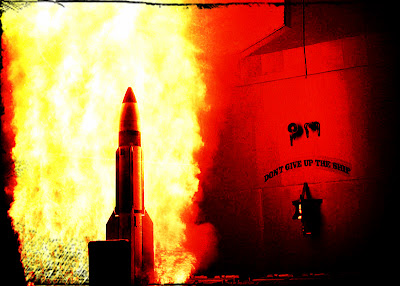Then there's the "both sides are just as bad" argument. It may be true that Syrian rebels are not good people. But the definition of war crime doesn't include the phrase "good people." A murderer killing another murderer is still murder and we put people who kill other criminals on trial for murder all the time. Not necessarily because the victims deserve justice (although I think everyone does), but because punishing crime is designed to keep good order. Besides, gassing civilian populations takes out people who'd rather not have anything to do with the war and are just sitting in their houses waiting for someone to win and end all the violence. I think we can dismiss the "both sides are just as bad" argument right there. If we look the other way when countries commit war crimes against people we don't trust, it's basically condoning it. "It's OK when you use it against bad guys" is legalizing this crime, since everyone thinks they're the good guys and the people they're killing are the bad guys. Whether you agree or disagree with some form of intervention in Syria, we should all agree to put this argument to a very painful and public death. It's extremely dangerous and verges on the genocidal.
But, as so many have rightly pointed out, we are not the world's police. It's not our job to go running off to answer every crime committed by any nation -- and we sure do let enough of them slide. We should only act in unison with the UN. Military action should always be a last resort and to take unilateral action is to travel down the road taken by George W. Bush. This did not work out well the last time. The problem here is the anachronistic and not at all democratic UN Security Council. The five permanent members of the Security Council hold all the power, being the only members who have veto power, and the make-up of the permanent council members -- China, France, Russia, the UK, and the United States -- guarantees that someone's interests will always conflict with the rest. In this case, China and Russia are allies with Syria -- and they're two countries who could not care less about human rights and war crimes.
Still, it looks like the UK is out on this one as well -- although it's probably not as clear how they'd vote on the Security Council. It's possible they could clear the way for action, but personally sit it out. But the bottom line is that the UN Security Council cannot be counted on to vote to enforce international law (and the US is as guilty of this as anyone, often vetoing to protect Israel's system of apartheid). In a perfect world, the UN Security Council would be disbanded and these things would go to a full vote, but this is not a perfect world.
At least it's not a partisan issue for the president at home. Intervention in Syria has split both parties. Much like the NSA controversy, Syria has become an issue that comes down to personal beliefs, rather than partisan ideology. Republicans, for example, are split between their hawkish impulses and the corporate world's desire for unending war on one hand, and their belief that Democratic presidents are always wrong about everything on the other.
I know it sounds like I'm leaning toward military action, but I'm just laying all the cards out. The bottom line question is "would we be justified in killing innocent people" -- because killing innocent people, especially if we avoid "boots on the ground," would be inevitable. I don't believe we would be. I don't believe some school kid or newlywed or corner butcher or what have you absolutely must be sacrificed for the crimes of the Syrian government. And, in the end, that's what the entire concept of war crimes is all about anyway -- to protect the lives of innocents. If we kill innocent people in response to war crimes, it's missing the whole damned point by about a million miles. Even the targeted strikes the President advocates, aimed at disabling the government's ability to use chemical weapons (i.e., the stockpiles, manufacturing facilities, means of deployment, etc.), will result in the deaths of innocents -- this is especially true since intelligence can't possibly be 100% accurate and we'd wind up taking out "suspected" sites.
There has to be another way, because doing nothing is also not a moral option. Thank goodness I'm not the one tasked with coming up with an alternative, because right now I'm pretty stumped.
-Wisco
[photo via Wikimedia Commons]
Get updates via Twitter





